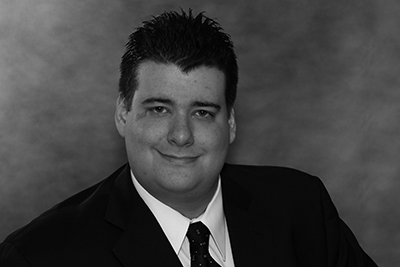40 under 40: Michael Glasser, president, Glasser Security Group

By Cory Harris, Editor
Updated 9:55 AM CDT, Wed May 31, 2023

YARMOUTH, Maine—Michael Glasser, 40, is the president of Glasser Security Group, a New York City-based boutique security consulting firm with vast experience in physical, electronic and information security. Find out what inspired him to pursue a career in the security industry, what being a "40 under 40" winner means to him, what appeals to him about the security industry, and more.
SSN: Describe your roles, duties, and tenure at your current job.
 GLASSER: Glasser Security Group LLC (GSG) is a boutique security consulting firm specializing in physical and electronic security consulting, expert witness services on security related legal cases, and operational testing services through the WeSneakIn.com sub-brand. GSG focuses on low-volume, high-engagement client relationships.
GLASSER: Glasser Security Group LLC (GSG) is a boutique security consulting firm specializing in physical and electronic security consulting, expert witness services on security related legal cases, and operational testing services through the WeSneakIn.com sub-brand. GSG focuses on low-volume, high-engagement client relationships.
Aside from the traditional consulting services, I have been spending a lot of energy to evangelize physical security penetration and operational testing services. The cybersecurity industry strongly embraces external auditing and penetration testing but those within the physical and electronic security industry are often resistant.
My belief is that the physical and electronic security industries would receive considerable benefits by regularly utilizing external audits, operational testing, and penetration testing. This is partially to improve the quality of systems and services, but a big part that is frequently misunderstood is about the ability to articulate and demonstrate risks that follow these services. Demonstrating risk is the key to getting budgets approved.
SSN: What inspired you to pursue a career in the security industry?
GLASSER: My family is from the security system industry. When young, my father guided me to focus on computers instead of the security system industry. The TRS-80 and Commodore 64 were toys and tools at the same time. At the same time, we played with ham radio, electronics, and alarm systems.
When I was eight, my father worked for an alarm system manufacturer that wanted to bring a new product to the U.S. market. He brought home the new system, gave it to me and told me to set it up. After a while, I had some real challenges. Up until then, I had been able to wire, program and fully setup all the other panels and systems from various manufacturers. When I failed with this new product, he returned it to the engineering department from the manufacturer, explaining that the system wasn’t ready for the U.S. market.
As I entered my teen years and needed a summer job, I worked with my mother at a central station. My duties included fixing computers (primarily dumb terminals at the time), assisting in the central station, stocking the vending machine and anything else the boss told me to do, including going on the roof during a hurricane to fix a leak. Before I could drive, my mother would drive me to classes that my father was teaching about alarm systems. When I embraced them and wanted to learn, I was enrolled as a student in an alarm system certification program. Several instructors educated me and by 16 I was a Certified Security Technician. New York State licensing requires that all licensed security installers must be 18. I submitted my paperwork before I was 18 and was awarded the license around my birthday, resulting in me being the youngest licensed security system installer in New York.
However, I wanted to work in cyber, not physical/electronic security. That was right about as the dot-com bubble burst, and I couldn’t find a job in IT/cyber, so I took a job working for an alarm company for a while. Then I was a locksmith, which taught me a ton about access controls, doors, and hardware. Then I was lucky enough to move into security consulting, where I have remained since.
SSN: What does being named a winner of SSN's 40 under 40 mean to you?
GLASSER: For many years, I was “the kid.” “Kid – I’ve been doing this for 20 years.” I’m looking for the next “kid” who loves this industry as much as I do. Hopefully, someone somewhere will read this and contact me, allowing me to help mentor them and give back to the industry. With SSN naming me to the 40 under 40 list, the increased opportunity to give back is what I’m most grateful for.
SSN: As a young leader, what appeals to you about the security industry?
GLASSER: The passion I have for security is different than other industries. I’ve consulted on IT, AV, and other topics and while I enjoyed the work, I wasn’t passionate about it. Security is in my blood. Helping people and protecting my clients drives me. The industry is what I know, how I feed my family, and while it is my job it is also my hobby. My peers, friends and clients make fun of me for being so happy and passionate about security in all forms. While they’re reading about a new golf driver or a new car, it’s likely that I’m reading about the history of the security industry or a new widget that hit the market.
SSN: With the hiring, recruitment and retention challenges brought on by the COVID-19 pandemic, how can the security industry engage young talent?
GLASSER: Offer a career with a career path and not just a job. I have seen too many technicians come from other related industries and consider this industry just a job. Yesterday they installed tiles, today a motion detector and tomorrow roof shingles. Some of thew were very smart and skilled but didn’t see a career path presented.
If we want to recruit and keep talent, we need to show them the path to success but also explain that it isn’t typically overnight. I’m proud that I’ve recruited and developed several people who are successful in the industry today. Admittedly, there also have been several who have come and gone. Trade shows are in my opinion a huge value when young talent is properly allowed to both be handheld as they walk through but also allowed to explore and find what interests them. Unfortunately, many companies reserve trade shows for the more senior team members.
Further, many companies are afraid that if the younger talent is allowed to participate in trade shows or networking that they will be recruited away. “The only thing worse than training your employees and having them leave is not training them and having them stay.” - Henry Ford, founder, Ford Motor Company
Comments